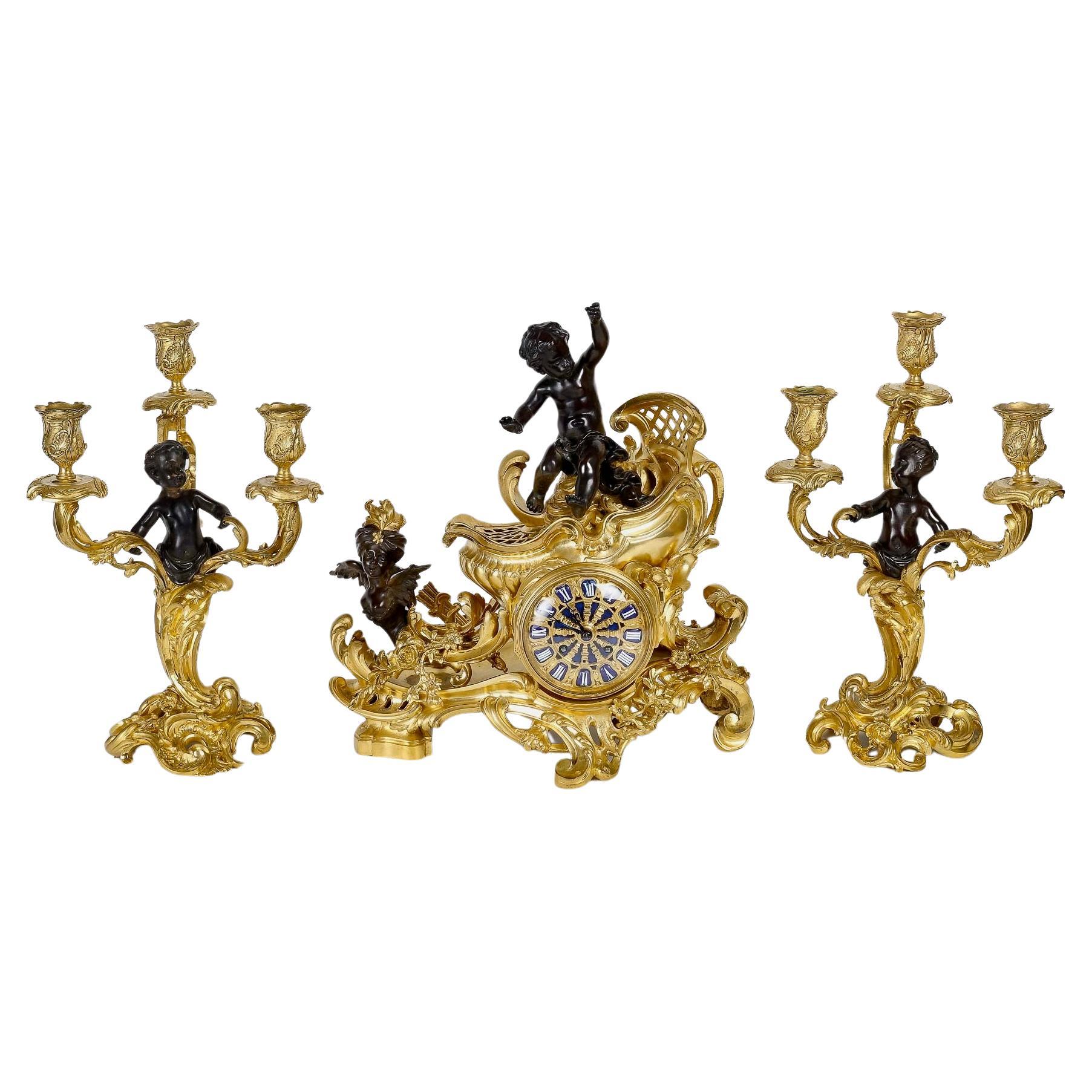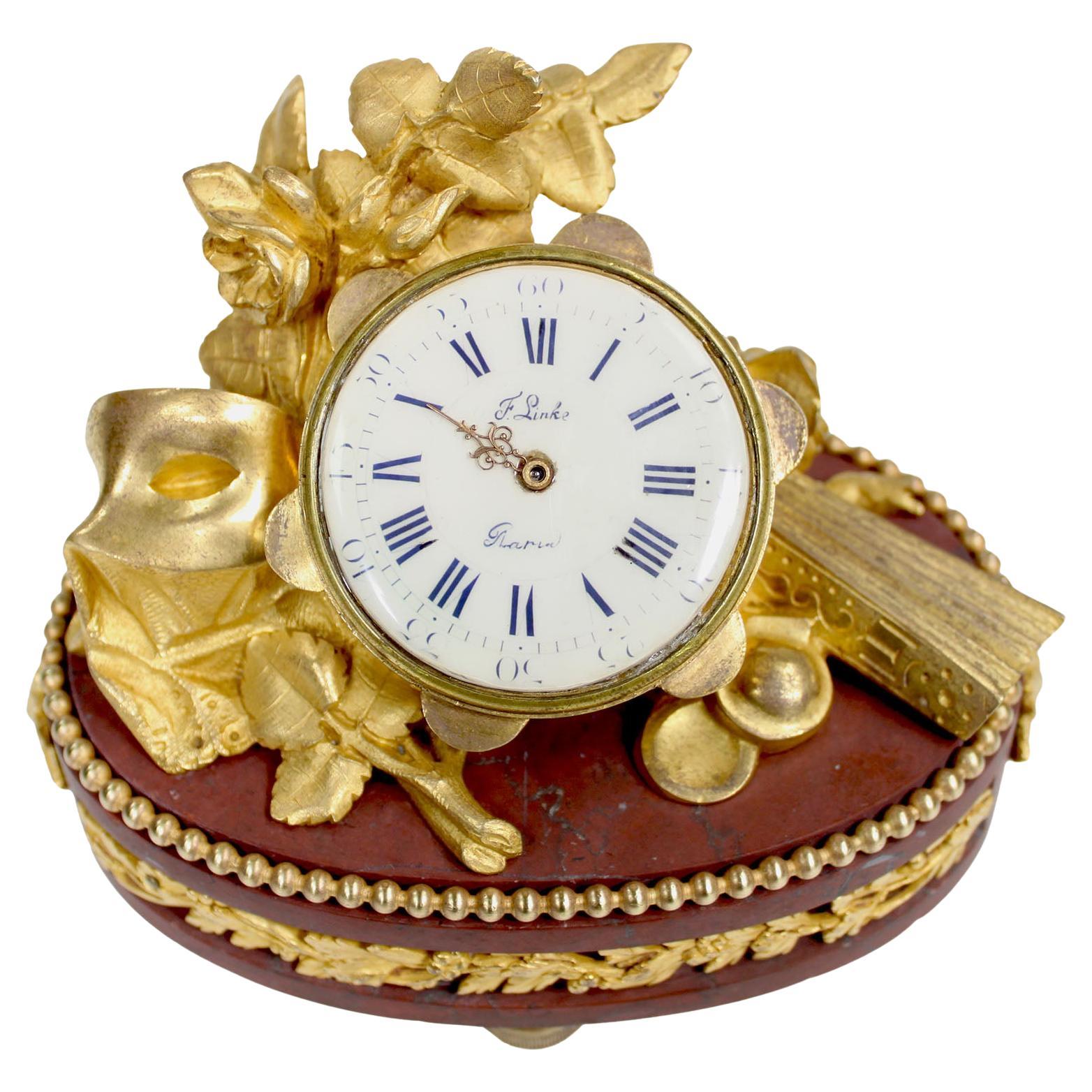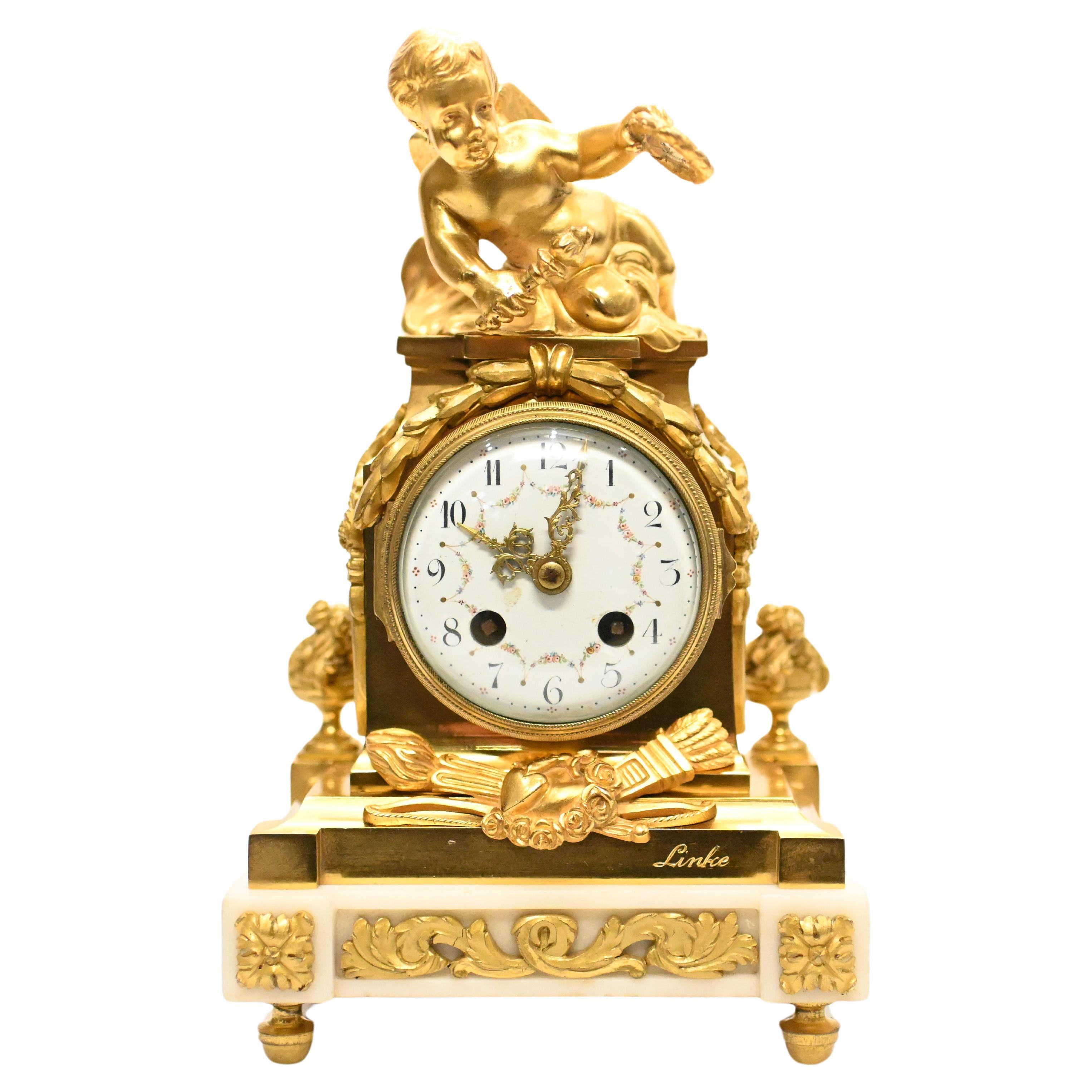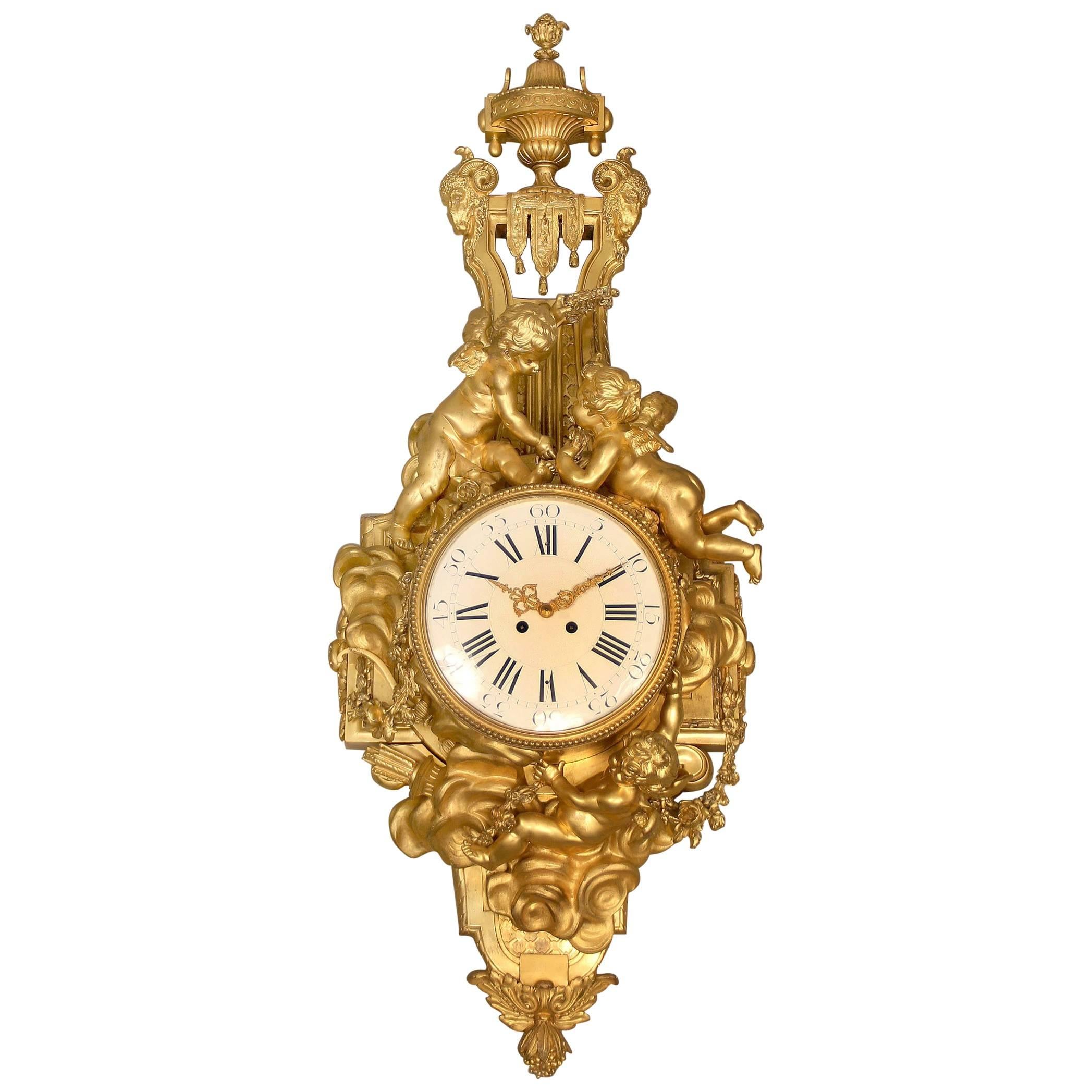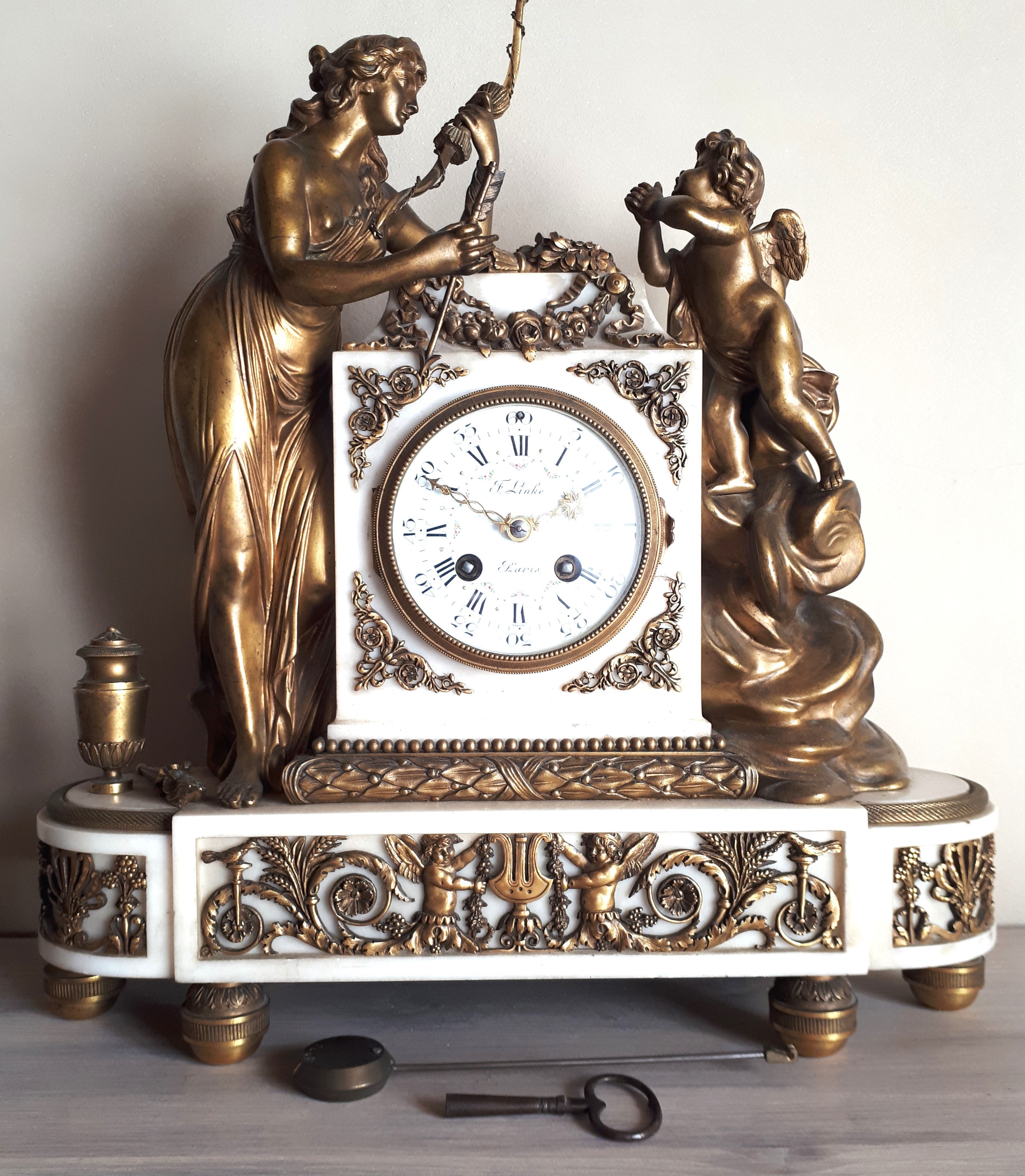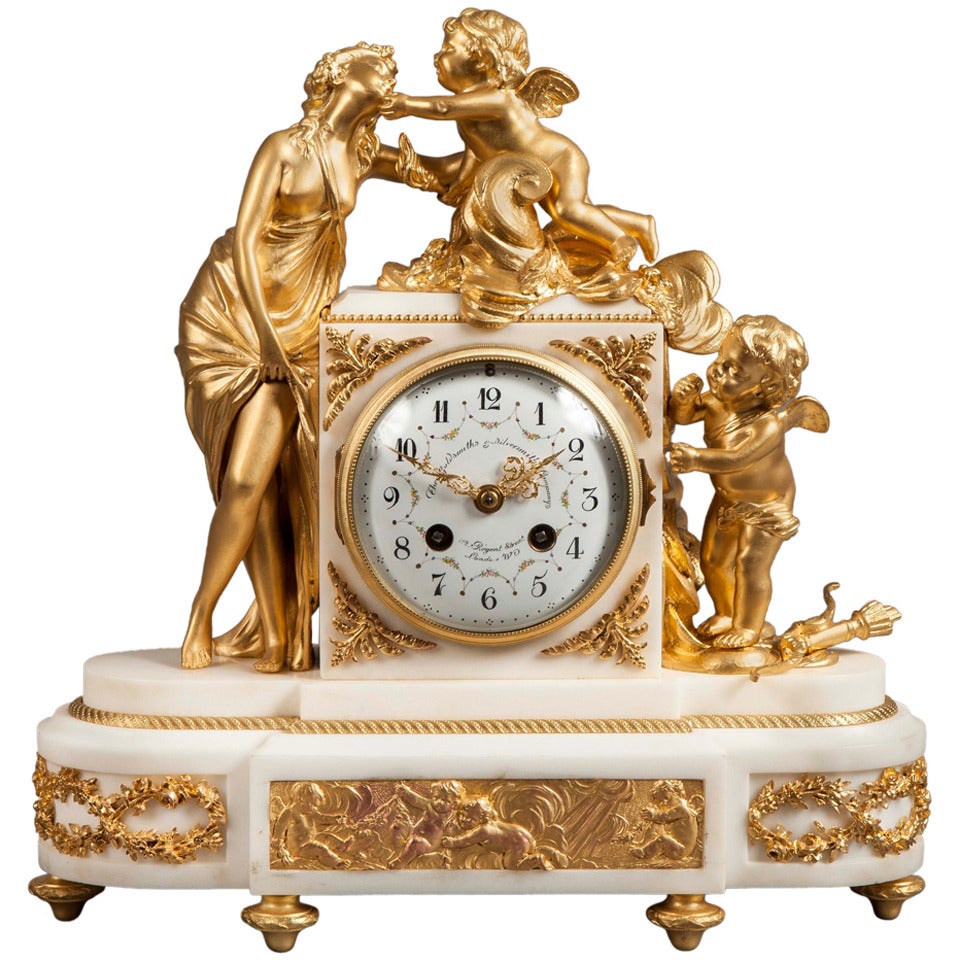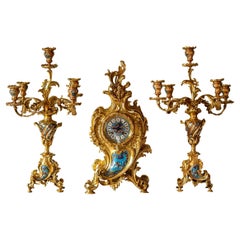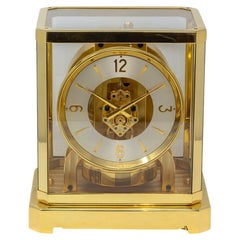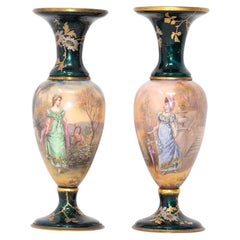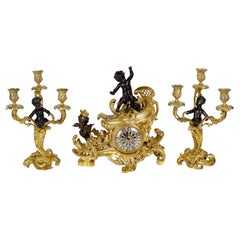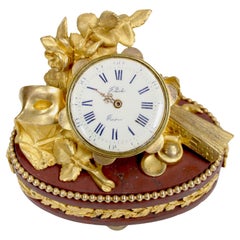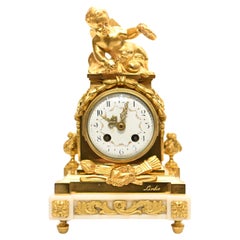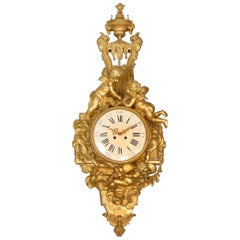Items Similar to Antique French Mantle Chariot Clock François Linke
Want more images or videos?
Request additional images or videos from the seller
1 of 19
Antique French Mantle Chariot Clock François Linke
About the Item
Dragon Drawn Chariot
From our Clock collection, we are thrilled to introduce this French Mantle Clock attributed to Francois Linke. The Clock in the rococo style cast as a winged Cherub wearing a billowing robe riding in a gilt chariot being pulled by a writhing Dragon outstretched climbing up with its left arm pointing towards the sky. The Chariot beautifully executed with a French Royal crest to the rear with interlaced monogram surmounted by a crown. The chariot sat upon a naturalistic cloud like formation with an ormolu scrolling border. The clock sits in the chariot simulating the wheel with a white enamel dial decorated with black numbers and floral garlands. The French Mantle Clock is firmly attributed to renowned French cabinet maker François Linke and is a known model by the maker. The Mantle Clock dates to the late 19th century during the Belle Epoque era circa 1895. The clock has been fully stripped down and professionally serviced before being available on the market.
Provenance The Clock has been purchased directly from a long held private UK collection.
François Linke (1855–1946) was a one of the most important and influential Parisian cabinet makers of the late 19th and early 20th centuries. Born on 17 June 1855 in the small Bohemian village of Deutsch Pankraz (Jítrava today) in the Czech Republic he apprenticed to a master cabinet maker named Neumann. It is believed that before setting up his own independent workshop in Paris François Linke took a role with a German cabinet maker which from similarities and location to in which Linke worked is believed to have been renowned cabinetmaker Emmanuel Zwiener. By 1881 Linke had set up his own independent workshop at 170 Rue du Faubourg Saint-Antoine, Paris. He later expanded to 26 Place Vendôme, arguably the capital’s most fashionable address. One of François Linke biggest accolades was the extraordinary commission to furnish the Ras El Tin Palace in Alexandria for King Fuad of Egypt. This was arguably the biggest single commission in history overtaken that undertaken in Versailles, France.
Ormolu is the name given to a gilding technique which consists of applying a finely ground high-carat gold–mercury amalgam to an object of bronze. The mercury is driven off in a kiln with extreme heat leaving behind a gold coating. Also known as bronze doré in French or gilt bronze in English. Around 1830, legislation in France had outlawed the use of mercury for health reasons however it was continued to be used until 1900s. This process has generally replaced today by electroplating gold over base substrate.
Bronze is an alloy consisting primarily of copper with approximately 12–12.5% tin and often with the addition of other metals (including aluminium, manganese, nickel, or zinc) and sometimes non-metals, such as phosphorus, or metalloids such as arsenic or silicon depending on the age of the bronze and its origin. The additions of other metals produce a range of alloys that are usually harder than copper alone and carry useful properties such as strength. The earliest known use of bronze dates to the 5th millennium BCE from Iranian plateau, the bronze mix consists of arsenical copper and copper-arsenide. The earliest tin-copper-alloy recovered is dated to circa 4650 BCE and was found in Plocnik, Serbia. It is believed to have been smelted from a natural tin-copper ore.
Belle Epoque is a period of French, Belgian and European history. It began in the early 1870’s and to ended with the outbreak of World War I in 1914.
Antique a collectable object such as a piece of furniture or work of art that has a high value because of its age and quality. Objects of this nature are generally considered antique at 100 plus years of age.
Enamel (vitreous enamel) also known as porcelain enamel, is a material made by fusing powdered glass to a substrate by firing, usually between 750 and 850 °C. The powder melts, flows, and then hardens to a smooth, durable vitreous coating. The word vitreous comes from the Latin vitreous, meaning “glassy”.
- Attributed to:François Linke (Maker)
- Dimensions:Height: 26.5 in (67.31 cm)Width: 36.5 in (92.71 cm)Depth: 13.5 in (34.29 cm)
- Style:Belle Époque (Of the Period)
- Materials and Techniques:
- Place of Origin:
- Period:
- Date of Manufacture:Circa 1895
- Condition:
- Seller Location:Newark, GB
- Reference Number:Seller: BONDD1stDibs: LU6971239544812
About the Seller
5.0
Gold Seller
These expertly vetted sellers are highly rated and consistently exceed customer expectations.
Established in 2019
1stDibs seller since 2022
22 sales on 1stDibs
Typical response time: <1 hour
- ShippingRetrieving quote...Ships From: Newark, United Kingdom
- Return PolicyA return for this item may be initiated within 14 days of delivery.
Authenticity Guarantee
In the unlikely event there’s an issue with an item’s authenticity, contact us within 1 year for a full refund. DetailsMoney-Back Guarantee
If your item is not as described, is damaged in transit, or does not arrive, contact us within 7 days for a full refund. Details24-Hour Cancellation
You have a 24-hour grace period in which to reconsider your purchase, with no questions asked.Vetted Professional Sellers
Our world-class sellers must adhere to strict standards for service and quality, maintaining the integrity of our listings.Price-Match Guarantee
If you find that a seller listed the same item for a lower price elsewhere, we’ll match it.Trusted Global Delivery
Our best-in-class carrier network provides specialized shipping options worldwide, including custom delivery.More From This Seller
View AllFrench Gilded & Champleve Clock Garniture
Located in Newark, England
Fine French late 19th century three-piece clock garniture comprising of a pair of candle sticks and clock in a matching set. The garniture boldly cast with rococo influence in the Lo...
Category
Antique Late 19th Century French Napoleon III Table Clocks and Desk Clocks
Materials
Metal, Bronze, Enamel, Ormolu
Jaeger-LeCoultre Atmos Clock Silvered Dial
By Jaeger-LeCoultre
Located in Newark, England
Fully Stripped Cleaned & Serviced
From our Clock collection, we are delighted to offer this Jaeger-LeCoultre Atmos clock. The Atmos clock with f...
Category
20th Century Swiss Art Deco Table Clocks and Desk Clocks
Materials
Metal, Gold Plate, Brass
Antique French Pair of Limoges Enamel Vases
By Limoges
Located in Newark, England
Belle Epoque Circa 1880
From our Decorative collection, we are pleased to offer this pair of Antique French Limoges Enamel Vases. The French Lim...
Category
Antique Late 19th Century French Belle Époque Vases
Materials
Metal, Enamel
Antique French Dog Bronze Sculpture by Emmanuel Fremiet
By Emmanuel Fremiet
Located in Newark, England
Modelled as a Wounded Hound
From our Sculpture collection we are delighted to offer this French Dog Bronze by Emmanuel Fremiet. The French Bronze modelled as a laying wounded dog ha...
Category
Antique Late 19th Century French Belle Époque Animal Sculptures
Materials
Bronze
Antique French Bronze Pheasant and Weasel by Jules Moigniez
By Jules Moigniez
Located in Newark, England
Pheasant and Weasel
From our Sculpture collection, we are delighted to offer this French Bronze Pheasant by Jules Moigniez. The French Bronze of good scale cast with a large male Pheasant clambering upon a rocky outcrop startled by a Weasel hiding within the foliage. The Pheasant naturalistically cast with individual feathers visible, sharp claws and spurs above the foot. The Weasel sits hidden in the foliage visible from viewing the French Bronze from the side as it shocks the Pheasant. The French Bronze signed to the front left on a rock face J. Moigniez (Jules Moigniez). The bronze sculpture dates to the late 19th century belle époque period Circa 1870.
Jules Moigniez (1835-1894) was born at Senlis, Oise, just north of Paris, France on the 28 May 1835 the son of a metal gilder. Moigniez studied under Paul Comoléra (1813-1890) a specialist Animalia sculptor. It is clear that Moigniez’s career in Animalia was passed down from his tutors specialism in Animalia and in particular birds. Moigniez father bought a foundry specifically to cast his son’s sculptures. This gave Moigniez a huge advantage compared to other artist as it greatly reduced his costs during manufacturing and increased productivity keeping the process in-house. Moigniez throughout his career became known for this Animalia sculptures...
Category
Antique Late 19th Century French Belle Époque Animal Sculptures
Materials
Bronze
French Bronze Ariadne After Clodion
By Claude Michel Clodion
Located in Newark, England
Signed Clodion
From our Sculpture collection, we are pleased to offer this French Belle Epoque Bronze of Ariadne cast after Clodion (Claude Michel). The sculpture of fine casting and beautiful patination is sculpted as a bust of a Ariadne in nature with her hair tied up and leaves intwined in her hair. The Bronze sits upon a circular socle with a square base signed to the right hand face Clodion. The Bronze cast after the original during the neoclassical era dating to the second half of the 19th century during the Belle Epoque era (c.1970-1914) circa 1875.
Clodion was the alias of Claude Michel (1738-1814) a French born sculptor working in the Rococo style, especially noted for his works in marble, bronze, & terracotta. Many of Clodion’s works feature in museum collections around the world with some of his most pivotal works including The Intoxication of Wine and The Dance of Time.
Ariadne In Greek mythology was a Cretan princess and the daughter of King Minos of Crete. Ariadne was known for aiding Theseus escape the Minotaur and then being abandoned by him on the island of Naxos. There, Dionysus saw Ariadne sleeping, fell in love with her, and later married her. Many versions of the myth recount Dionysus throwing Ariadne’s jewelled crown into the sky to create a constellation, the Corona Borealis...
Category
Antique Late 19th Century French Belle Époque Busts
Materials
Bronze
You May Also Like
A French ‘Chariot’ Three-pieces Clock Garniture attributed to F.Linke circa 1890
By François Linke
Located in Saint-Ouen, FR
A French Ormolu and Patinated-Bronze ‘Chariot’ Three-pieces Clock Garniture
Attributed to François Linke (1855 - 1946), Paris, Late 19th/ Century
The clock representing a putto on ...
Category
Antique 1890s French Napoleon III Mantel Clocks
Materials
Bronze, Ormolu, Enamel
Fine Gilt-Bronze & Rouge Griotte Marble Table Clock - François Linke Index No 86
By François Linke
Located in Los Angeles, CA
A Fine French 19th Century 'Belle Époque' Gilt-Bronze and Rouge Griotte Marble Table Clock by François Linke (1855-1946) Index Number 86. The clockcase modelled as a tambourine amidst blossoming roses, a mask and fan, on an oval bead-edged marble plinth with recessed panels mounted with fruiting vines, on turned feet, the reverse of the white enamel clock dial with Roman hours and Arabic minutes signed 'F. Linke, Paris', timepiece movement. Circa: Paris, 1895.
François Linke (d. 1946) was awarded the gold medal for his Grand Bureau at the 1900 Paris Exposition Universelle. He was the most celebrated Ébéniste of his time. Born in Bohemia in 1855, he moved to Paris in 1881. He produced furniture of the highest quality at his workshops at 170, rue du Faubourg-Saint-Antoine, and established showrooms at 26, Place Vendme. A much simpler version of this commode, with fewer ormolu mounts and with no marquetry, is illustrated in Christopher Payne's "François Linke 1855-1946 The Belle Epoque of French Furniture" Antique Collectors' Club, 2003 Edition, Index 720, Page 498.
Literature
Payne, C., François Linke 1855-1946: The Belle Epoque of French Furniture, 2003, models illustrated pp. 160, 182, 247 and the black and white cliché on p. 487.
Another example of this model was sold at Sotheby's New York, Sale 19th Century Furniture, Sculpture, Ceramics, Silver and Works of Art on April 22, 2010, Lot 448 'Lot 448: FRANÇOIS LINKE 1855 - 1946 A GILT-BRONZE AND ROUGE GRIOTTE MARBLE TABLE CLOCK PARIS, CIRCA 1895, INDEX NUMBER 86' Sold for $10,000 USD
Another example of this model was sold at Christie's New York, Sale '500 Years: Decorative Arts Europe' (PROPERTY FROM THE COLLECTION OF RAYMOND AND MIRIAM KLEIN) on October 20, 2011, Lot 146A 'A FRENCH ORMOLU AND ROUGE MARBLE TABLE...
Category
Antique Early 1900s French Belle Époque Table Clocks and Desk Clocks
Materials
Griotte Marble, Bronze, Ormolu
$6,750 Sale Price
28% Off
French Gilt Mantle Clock by Linke French 1890 Cherub
Located in Potters Bar, GB
Highly collectable French gilt mantle clock by Francois Linke
Piece is signed on the base, please see close up photo
The casting and intricacy to the gilt is incredibly detailed
Clas...
Category
Antique 1890s Mantel Clocks
Materials
Glass
Unique Late 19th-Early 20th Century Gilt Bronze Cartel Clock by François Linke
By François Linke
Located in Long Island City, NY
A palatial and unique late 19th-early 20th century gilt bronze Cartel clock
By François Linke
The heavy and great quality bronze clock is topped by an urn with rams heads and c...
Category
Antique Late 19th Century French Belle Époque Wall Clocks
Materials
Bronze
Mantel clock - pendulum by François Linke in marble and gilded bronze
By François Linke
Located in Saverne, Grand Est
Magnificent composition for this clock in marble and chiselled, gilded and patinated bronze depicting Venus disarming Cupid, who begs the goddess to return him bow and arrow.
The whi...
Category
Antique Late 19th Century French Louis XVI Mantel Clocks
Materials
Marble, Bronze
French Antique Ormolu Mantle Clock
Located in London, GB
An attractive Parisian mantle clock in the Louis XVI manner
Retailed by the Goldsmiths & Silversmiths Company
Constructed in Carrar...
Category
Antique 19th Century English Clocks
Materials
Marble, Ormolu
Recently Viewed
View AllMore Ways To Browse
High End Antiques
French Market Collection Furniture
French Market Collection
Capital France
Used Chariot
Antique French Furniture Uk
Francois Linke Furniture
Francois Linke
Europe Clock
Antique Metal Clocks
Metal Antique Clock
Iran Objects
Floral Clocks
Small Decorative Clocks
French Robe
Gold Antique Clock
Enamel Antique Clock
French Vendome
